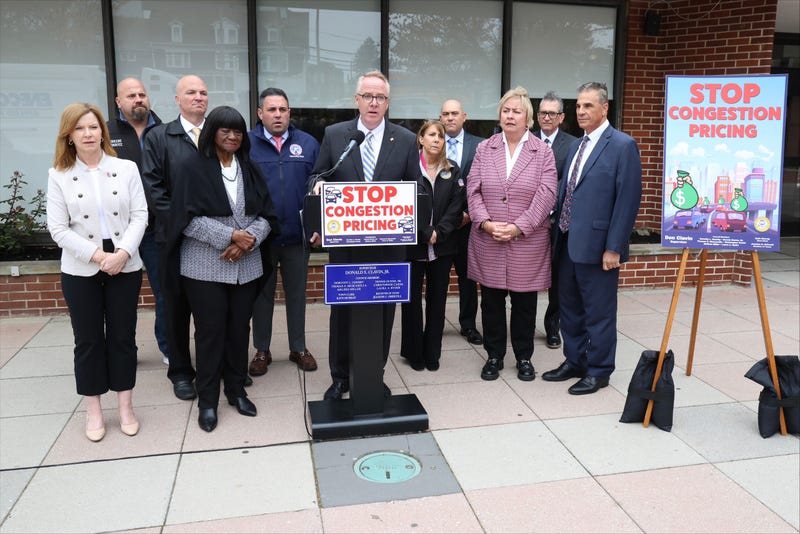
HEMPSTEAD, N.Y. (1010 WINS/WCBS 880) — The Town of Hempstead filed a federal lawsuit on Wednesday to stop the MTA’s congestion pricing plan, joining an array of lawsuits but becoming the first municipality to initiate a legal challenge against the tolling plan.
Congestion pricing, officially called the Central Business Tolling Program, is expected to go into place on June 30 and will charge most drivers at least $15 daily to enter Manhattan below 60th Street during the daytime. Exemptions have been established for emergency vehicles, specialized city vehicles, buses, vehicles carrying disabled people and certain low-income commuters.
The lawsuit lists the Town of Hempstead and Town Supervisor Donald Clavin as plantiffs while officials from the MTA and Federal Highway Administration are defendants. Filed in the U.S. District Court’s Eastern District of New York, the lawsuit is pursuing an injunction to stop the implementation of the plan.
Newsday reported that the suit alleges congestion pricing “treats classes of persons differently for the same activity with no rational basis, in violation of the equal protection of the laws as provided for in the New York State and Federal Constitutions,” and violates the "substantive due process rights" of drivers by treating different classes of vehicle operators differently.
Clavin joined WCBS 880’s Newsline with Brigitte Quinn on Thursday to discuss the suit, and he emphasized the belief that congestion pricing is “punishing” residents on Long Island for going into lower Manhattan, particularly those who commute to work, and that the MTA itself is mismanaged.
“We think it is clearly violating federal law and that’s why we’re initiating this action,” Clavin said while claiming that the tolling plan was not established through fair process.
He also mentioned the MTA’s vague proclamation that the funds generated by congestion pricing will be recirculated into the transit system, without pointing to specific improvements.
“It’s literally a money grab and everybody knows deep down it is, you know, the MTA stands for money thrown away as far as I’m concerned,” Clavin said.
Other lawsuits have been filed—with plantiffs like Staten Island, the United Federation of Teachers, New Jersey and a collection of NYC small business owners—in legal attempts to halt the controversial tolling plan. Clavin stated that he would join forces with any other entity he could to push through an injunction.
“It’s our obligation as elected officials to hold their feet to the fire, and you know what, it should have been passed really with the oversight of Congress, and we’re pushing for federal review,” Clavin said.
Clavin and the Hempstead Town Board held a press conference on Thursday morning announcing the lawsuit, with officials like Rep. Anthony D’Esposito joining to support the push for an injunction.
In a press release announcing the event, the plantiffs referred to congestion pricing as “a regressive tax” and questioned why first responders are being taxed to enter the city where they work to protect citizens.
“Many Long Island businesses are already subject to the MTA payroll tax, helping to bail out the company's fiscal mismanagement while local residents pay more to utilize mass transit at aging and outdated train stations,” the release stated.
The MTA has consistently responded to criticism regarding congestion pricing by emphasizing the positive outcomes it will bring in traffic, safety and the environment.
Rob Free, president of the Long Island Rail Road, joined WCBS 880’s Drive Time with Michael Wallace on Thursday afternoon to discuss the Town of Hempstead lawsuit.
According to Free, “The MTA has performed a comprehensive and thorough analysis, you know, looking into congestion pricing following all federal requirements, submitting all necessary documentation, public comment periods and I would even say that it, it’s been approved thus far from the federal agencies.”
Free stated that some people involved in the lawsuit were also against the LIRR Main Line Expansion, which added 9.8 miles of new third tracks, renewed several stations and completed other improvements to the system in 2022.
Since the completion of that project, Free said that LIRR service increased by 41% and reliability improved. In April, he said the LIRR was at 96.8% on-time performance, and that part of the purpose of congestion pricing is to encourage drivers to turn to a consistent mass transit system.
“I just really struggle with certain people not being in favor of improving the transit service on Long Island. Long Island needs a reliable, safe transportation system and we deliver on that,” Free said.
Free emphasized that while he is not a lawyer, he thinks that despite litigation, the MTA is in “a good position” to implement congestion pricing on June 30 and said that the agency has “complied with all the requirements.”
In response to the lawsuit filed by NYC small business owners, MTA Chief of Policy and External Relations John J. McCarthy said: "We are responding to their pro-traffic lawsuit in court, where a 4,000 page environmental assessment will make the case that congestion relief delivers less traffic, safer streets, cleaner air and more investment in the mass transit most people use."
Before Wednesday’s filing, MTA Chairman and CEO Janno Lieber said that the agency expects to resolve the existent lawsuits before the June 30 implementation of the tolling plan.
